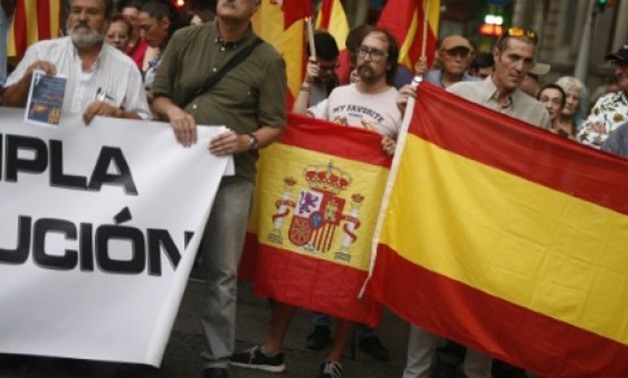
AFP/File / by Michaela CANCELA-KIEFFER | Spain's central government has vowed to use all possible means to stop Catalonia from holding a referendum on independence on October 1 - AFP
MADRID (SPAIN) - 7 September 2017: The Spanish government is to hold an emergency meeting Thursday after Catalonia's regional authority voted to push ahead with an independence referendum on October 1, sparking the country's deepest political crisis in 40 years.
After gathering his cabinet to formally ask Spain's Constitutional Court to once again rule against the vote, conservative Prime Minister Mariano Rajoy will hold talks with the head of the main opposition Socialist Party, Pedro Sanchez, a government spokesman said.
The Catalan parliament will also meet again Thursday to examine a "transition law" laying out how the region would function if the majority of its 7.5 million inhabitants vote in favour of seceding from Spain.
Catalonia's president Carles Puigdemont, a lifelong proponent on independence, is hoping to mobilise supporters in a show of legitimacy in the face of Madrid's threats to halt the vote by any means possible.
Both sides are now racing against the clock, after Catalan lawmakers approved the vote in a marathon session Wednesday despite a February ruling by the Constitutional Court declaring that it would be unconstitutional.
- 'No future' -
The looming showdown was set up late Wednesday after lawmakers approved the referendum with 72 votes in favour and 11 abstentions after 12 hours of often stormy debate in the regional assembly.
Lawmakers who oppose independence for the wealthy northeastern region of Spain quit the chamber before the vote.
After the law was passed, separatist lawmakers sang the Catalan anthem, "Els Segadors", which recalls a 1640 revolt in the region against the Spanish monarchy.
"The concept of state and unity of the homeland... doesn't have a future in modern democratic Europe," Puigdemont said after the vote.
Shortly after the law was passed Puigdemont and the rest of his cabinet signed a decree calling the referendum, presenting a show of unity in the face of threats of legal action by Madrid.
Spain's Deputy Prime Minister Soraya Saenz de Santamaria had warned before the law was passed that the government had asked the Constitutional Court to declare "void and without effect the agreements adopted" by the Catalan parliament.
Public prosecutors, meanwhile, have announced they will seek criminal charges for disobedience against the president of the Catalan parliament, Carme Forcadell, and other Catalan officials for allowing the vote on the referendum law.
- 'Lost all legitimacy' -
In a tweet Wednesday, Forcadell said she had requested that the 12 judges at the Constitutional Court be disqualified, calling them "another extension of the state which has lost all legitimacy".
Most of the court's judges have been nominated by lawmakers from Rajoy's Popular Party.
Catalonia accounts for about one-fifth of Spain's economic output, and has significant powers over matters such as education and healthcare.
But Spain's economic worries, coupled with a perception that the region pays more in taxes than it receives in investments and transfers from Madrid, have helped push the cause of secession from the fringes of Catalan politics to centre stage.
Adding to the rise in separatist sentiment was a 2010 ruling by the Constitutional Court striking down parts of a 2006 autonomy charter which granted new powers to Catalonia and recognised it as "a nation".
Lawmakers who back independence won an absolute majority in the 135-seat regional parliament for the first time in a September 2015 election. The government that emerged from that vote vowed to begin the process of breaking away from Spain.
Rajoy responded by promising new investments in Catalonia and regularly sent his deputy to the region, but made no significant reforms regarding the division of powers that addressed Catalan concerns.
Opinion polls show that Catalans are evenly divided on independence. But over 70 percent want a referendum to take place to settle the matter, similar to the plebiscite held in Scotland in 2014.
The Catalan government staged a symbolic independence referendum in 2014, when more than 80 percent of participants voted to split from Spain -- though only 2.3 million of Catalonia's 5.4 million eligible voters took part.
Spain's Court of Auditors ruled Tuesday that 11 former Catalan officials, including former Catalan president Artur Mas, must repay by September 25 the 5.1 million euros ($6.1 million) in public funds that it cost to hold that vote.


Comments
Leave a Comment